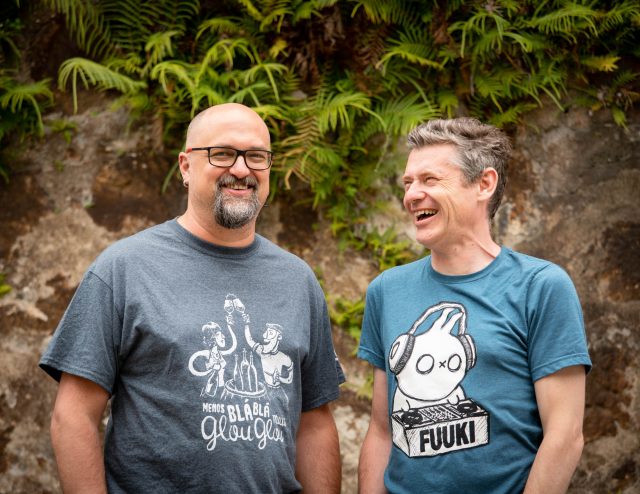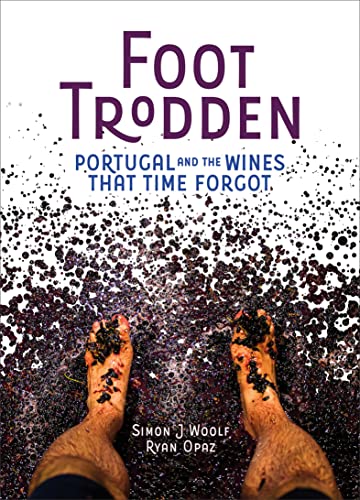This website uses cookies so that we can provide you with the best user experience possible. Cookie information is stored in your browser and performs functions such as recognising you when you return to our website and helping our team to understand which sections of the website you find most interesting and useful.
André Simon Awards shortlist extract: Foot Trodden by Simon J Woolf
The André Simon Food and Drink Book Awards have celebrated the best of contemporary food and drink writing for over 40 years. Food and drink assessors, Rose Murray Brown MW selected the shortlisted entries for the drinks category, while Nigerian-born writer and artist Yemisi Aribisala selected the food category titles.

An extract from Foot Trodden – Portugal and the Wines That Time Forgot by Simon J Woolf and Ryan Opaz, which is shortlisted for this year’ss André Simon drink book award.
Extract follows below:
15 October 2017 is a date that António Lopes Ribeiro and Sara Dionísio will never forget. The winemaking couple, better known to the world as Casa de Mouraz, were in bed at their house in Tondela, a small town on the eastern edge of the Dão region.
Their winery is situated in the hamlet of Mouraz, a seven-minute drive away, but their stock of bottled wines was in a rented warehouse a few kilometres further up the road. The phone rang late that night and it was a neighbour with bad news: “Your warehouse is on fire”. Savage forest fires that had started further north in Galicia had reached the Dão, thanks to Hurricane Ophelia and wind speeds of up to 100km/h.
As the night sky literally filled with balls of fire and the temperature soared to around 30℃, António drove to the warehouse to try to salvage what he could. It wasn’t a pretty sight. The building was almost totally destroyed, and with it around 60,000 bottles of wine – a quantity that the couple would later describe as “uncountable”.
The damage wasn’t limited to their warehouse. Farming equipment and more than half of António and Sara’s 20 hectares of vineyards were also burned. Some plots survived, with partly singed trunks or branches, but other vineyards were wiped out. One of the casualties was the vineyard in Botulho in Tondela, a plot with vines of more than 100 years old and a fascinating field blend with around 30% of white varieties. The final vintage of this wine, labelled Bot, was produced in 2017. Tasting the wine at the winery in 2019 was a bittersweet experience. Its peppery, herbaceous fruit was charming, quirky and lightweight, yet it was full of gravitas and structure.
Several weeks went past before António could bear to return to the vineyards. “It’s like some part of his body was burned,” said Sara. “The vineyards were here since he was a young boy, it’s part of his life”. The couple launched a crowdfunding appeal in December 2017, together with a video of them sitting amongst charred vines reflecting on the damage. It makes for painful viewing, with António clearly shell-shocked and heartbroken.
A small house in the middle of the Mouraz vineyards also burned down. António was born here, directly above the simple winery and lagares where his father made wine. Like everyone, António’s father sold most of his grapes to the local co-operative in Tondela but also made a small amount of wine that was sold and consumed locally. António and Sara had been restoring the house with the hope of making it their permanent home, it being just across the road from their small winery and surrounded by their vineyards. In retrospect, their temporary move to Tondela had been a lucky escape.
For Sara, the disaster has highlighted an urgent need for people to take better care of the countryside. She laments the almost total lack of forest management in the Dão. “It’s going to happen again,” she says, talking about the fires. “We still have all the conditions that this will keep happening, when no-one takes care of the countryside and with climate change bringing hotter summers”.
The pain that the fires have caused António and Sara goes far beyond mere financial pressure. Their attachment to the land runs deep. There’s a note in Sara’s voice, a feeling of helplessness or inevitability, should this ever happen again. It’s like watching a close family member get sick, and not being able to do anything about it.
Sara highlights another scourge on the Dão landscape as she drives us to one of the couple’s more seriously fire-damaged vineyards. Heading down a rough dirt track, the truck weaves its way through a scrubby forest full of tall eucalyptus trees. Sara reminisces about her first visit here, two decades ago. “It was so beautiful. So many different trees, chestnut, oak, pine. Now it’s almost all eucalyptus.” she says mournfully. “We called this our paradise forest. When I look at this now, I want to cry.”
Eucalyptus globulus, otherwise known as southern blue gum, is native to Australia. Originally brought to Portugal in the 19th century and planted to combat erosion, the species became hugely popular due to its use as pulp to make paper. The challenge is that Eucalyptus globulus is a highly invasive species, which needs no help at all to seed itself. Eucalyptus is slowly but surely taking over in unmanaged rural areas, which are plentiful in the Dão. Worse still, when wildfires clear an area, eucalyptus is what grows back, rather than the less dominant natives.
By 2011, this Australian invader already represented 20% of Portugal’s entire forested area. It creates a landscape full of dry and highly combustible material, making the likelihood of more devastating fires in the future much higher. The destruction of a once idyllic landscape by the combined forces of fire and eucalyptus globulus is a stark reminder of what can happen when custodians desert their land or just stop caring. The Dão is already one of the most sparsely populated parts of Portugal, with a trend towards increasing depopulation that doesn’t look set to change anytime soon. The hamlet of Mouraz doesn’t even boast a regular café, let alone any shops.
Some 1,000 square kilometres around Serra da Estrela are now designated as a natural park and conservation area. The wine regions further down in the foothills don’t enjoy any such official protection. They depend on impassioned and committed individuals such as Sara and António for their survival. Responsible cultivation of traditional crops such as vines can do more than merely putting a delicious liquid in your glass, it might just save an entire region from burning to the ground.

Extract from Foot Trodden – Portugal and the Wines That Time Forgot by Simon J Woolf and Ryan Opaz (Morning Claret Productions, 2021). Shortlisted for the André Simon Food and Drink Book Awards 2021. http://www.andresimon.co.uk/
The winner of each André Simon category will receive £2,000 prize money. In addition, there are the John Avery and the Special Commendation awards (£1,500) granted at the discretion of the judges.

